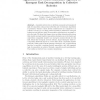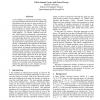813 search results - page 157 / 163 » Ensemble Algorithms in Reinforcement Learning |
ATAL
2004
Springer
14 years 23 days ago
2004
Springer
Product Distribution (PD) theory is a new framework for controlling Multi-Agent Systems (MAS’s). First we review one motivation of PD theory, as the information-theoretic extens...
PPSN
2004
Springer
14 years 21 days ago
2004
Springer
A scalable architecture to facilitate emergent (self-organized) task decomposition using neural networks and evolutionary algorithms is presented. Various control system architectu...
EGICE
2006
13 years 11 months ago
2006
Abstract. In knowledge representation by fuzzy rule based systems two reasoning mechanisms can be distinguished: conjunction-based and implication-based inference. Both approaches ...
DCOSS
2008
Springer
13 years 9 months ago
2008
Springer
Energy is one of the most crucial aspects in real deployments of mobile sensor networks. As a result of scarce resources, the duration of most real deployments can be limited to ju...
IJCAI
2007
13 years 8 months ago
2007
A key problem in reinforcement learning is finding a good balance between the need to explore the environment and the need to gain rewards by exploiting existing knowledge. Much ...


